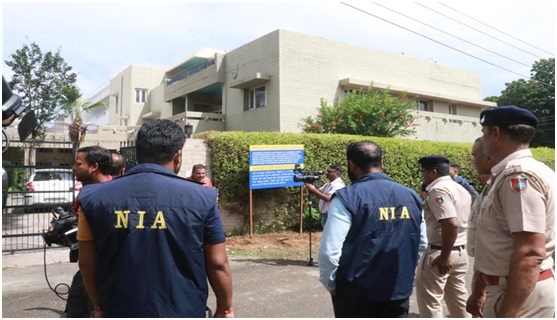The NIA and its Authority Regarding Property Seizure (Indian Express)

- 25 Sep 2023
Why is it in the News?
The National Investigation Agency (NIA) seized property, including land and a portion of a house owned by Gurpatwant Singh Pannu, the founder and attorney of the banned Sikhs for Justice based in the United States, in Amritsar and Chandigarh.
Why Was the National Investigation Agency Established?
- In recent decades, India has faced significant acts of terrorism originating from beyond its borders.
- Many of these attacks have intricate connections across states and international boundaries, possibly linked to activities like arms and drug smuggling, as well as the circulation of counterfeit Indian currency.
- Recognizing these challenges, there arose a need to establish a central-level agency dedicated to investigating terrorism-related offenses and certain other acts with nationwide implications.
- Various experts and committees, including the Administrative Reforms Commission in its report, had proposed the creation of such an agency.
About the National Investigation Agency:
- The National Investigation Agency (NIA) came into existence with the enactment of the National Investigation Agency Act in 2008.
- This Act empowers the NIA to:
- Take proactive notice of terrorist activities anywhere in India and initiate investigations.
- Enter any state without requiring permission from the state government.
- Conduct investigations and make arrests.
- The NIA is India's primary Central Counter-Terrorism Law Enforcement Agency.
Objectives:
- Establish high standards of excellence in national-level counter-terrorism and other security-related investigations by developing a highly skilled, collaborative workforce.
- Act as a deterrent to both existing and potential terrorist groups or individuals.Jurisdiction:
- The provisions of the NIA Act apply throughout India and extend to Indian citizens residing outside the country.
- Headquarters: New Delhi
- Supervising Ministry: Ministry of Home Affairs
Roles of NIA:
- Conducting thorough, expert investigations of scheduled offenses utilizing state-of-the-art forensic techniques, and establishing high investigative standards to guarantee the detection of all cases assigned to the NIA.
- Facilitating efficient and prompt legal proceedings.
- Fostering professional and cooperative interactions with the governments of States, Union Territories, and other law enforcement agencies, in accordance with the legal requirements of the NIA Act.
- Providing assistance to all States and other investigative bodies in handling terrorist cases.
- Establishing a comprehensive database containing all pertinent terrorist-related information and sharing this database with States and other relevant agencies.
Is the NIA Authorized to Carry Out Searches and Asset Seizures?
- Under the Unlawful Activities (Prevention) Amendment Act (UAPA), enacted in 2019, NIA officers have the authority to conduct searches and confiscate properties suspected of being associated with terrorist activities.
- NIA is not obligated to obtain permission from a state's Director General of Police.
- The investigating officer only needs approval from the Director General of NIA.
What Changes Were Introduced by the NIA (Amendment) Act 2019?
- Offenses Beyond Borders:
- Initially, the NIA had jurisdiction over crimes solely within India.
- However, the amended Act extends its authority to investigate crimes committed outside of India, provided it adheres to international treaties and the laws of the respective countries involved.
- If the Central Government believes that a crime committed abroad falls within the Act's jurisdiction, it can direct the NIA to investigate it as if it occurred in India.
Expanded Scope of Legal Authority:
- The NIA can investigate offenses listed in the Schedule of the NIA Act.
- Originally, this Schedule included Acts such as The Atomic Energy Act, 1962, The Unlawful Activities (Prevention) Act, 1967, and The Anti-Hijacking Act, 1982, among others.
- With the amendment, the NIA can now also probe cases related to:
- Human Trafficking
- Counterfeit currency or banknotes
- Prohibited arms
- Cyber-terrorism
- Crimes under the Explosive Substances Act, 1908
Establishment of Special Courts:
- The 2008 Act established Special Courts for the trial of cases under the Act.
- The 2019 amendment grants the central government the authority to designate Sessions Courts as Special Courts for the trial of Scheduled Offenses under the Act.
- Before doing so, the central government must consult with the Chief Justice of the relevant High Court.
- In cases where multiple Special Courts exist in an area, the most senior judge will assign cases.
- Additionally, state governments have the power to designate Sessions Courts as Special Courts to try scheduled offenses.
